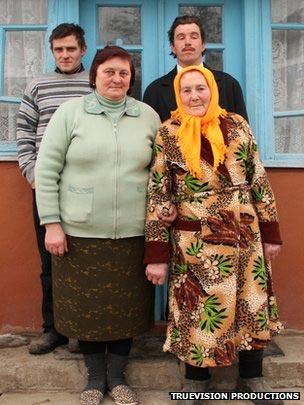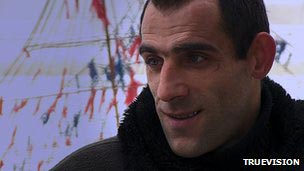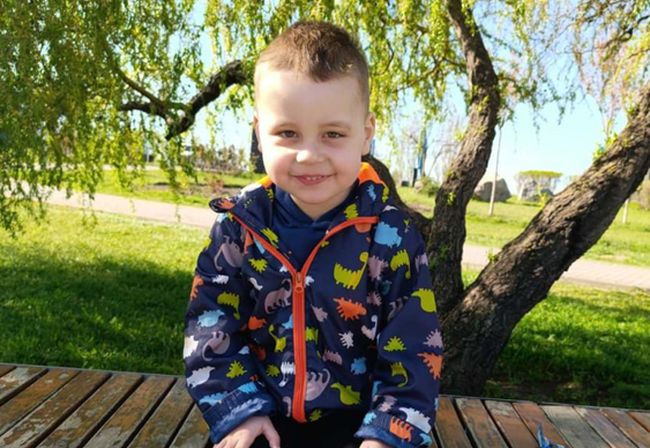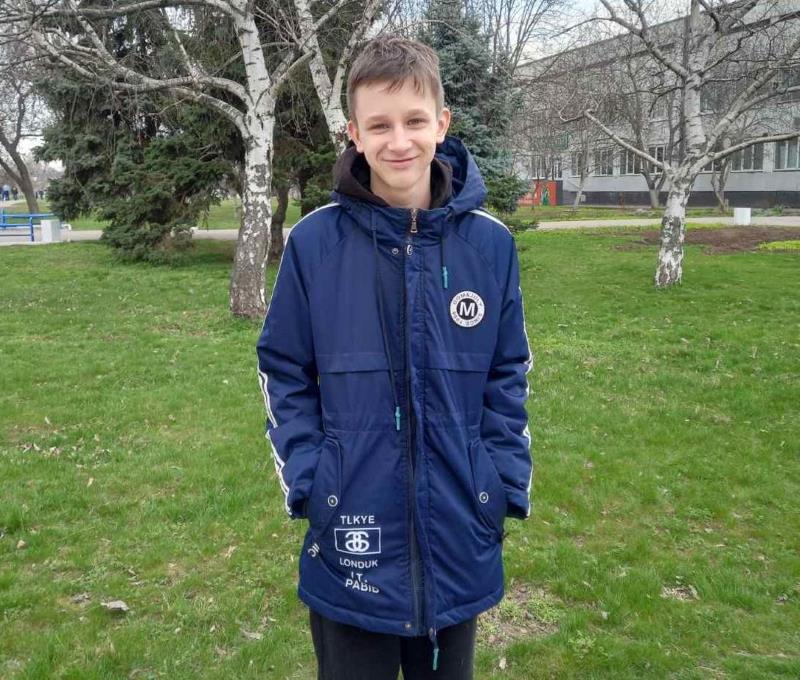
Ivanenko now lives with his guardian's mother
It is an official classification in Ukraine that critics say strips the bearer of basic human rights.
Being labelled "incapacitated" means that when someone designated as such reaches the age of 18, rather than leaving residential care, they are sent to live in psychiatric institutions or old people's homes.
They are even forbidden from living alone or marrying, and if they have children they too belong to the state.
For the severely disabled, there may be no other choice than to live in care, but according to campaigners in Ukraine up to a fifth of these young people are perfectly capable of living a normal life.
They are called social orphans - often either illegitimate or children of troubled parents - casualties of a Soviet-era system that made it easy for parents to give their children up to the state, with a simple signature.

Ivanenko (top right), lives with his guardian Zinaida (front left) and her mother
Boris Ivanenko, 31, was one of these children. When he was a baby, his mother handed him over to, what was then, the Soviet government. Until he was six he lived in an orphanage but was then moved to a psychiatric institution.
For the next 12 years he moved from institution to institution, often suffering neglect and abuse. In some of them, when he complained he was subject to beatings and severe humiliation.
When he reached 18, for a reason that is unclear to him, he was transferred to a geriatric home and told he wasn't allowed to leave. While there, he was forced to work on the institution's farm, shovelling manure with his hands and digging graves to bury the bodies of old people who had died.
"In every room there were three or four people. When they died in their beds the strong ones like me carried them out," says Ivanenko. "We took them to the mortuary, laid them in coffins, nailed down the lids and put the coffins into a car.
"Then we went to the cemetery, took them out of the car and buried them. I buried 150 people in two years."
He never understood why he was in care - although he had never learned to read or write as a child, he felt perfectly capable of looking after himself. But as an "incapacitated" man in the care of the state, he was forbidden from living alone.
"It was like living in a prison, but even worse. In prison you can write to complain to someone," he says.
According to Ivanenko, the institutions in which he grew up were more than neglectful, they were abusive. Before adulthood, he lived at an orphanage where he says he was raped by older orphans. When he complained, he was told it was his own fault.
But he still counts himself among the lucky ones. He has found a legal guardian Zinaida Shevchuk - a staff member at one of the institutes where he lived - who has taken him into her care. He lives with her and her mother in her house in a rural village.
She recognised that Ivanenko didn't belong in care and contacted Tatyana Makarava, a wealthy businesswoman who had been fighting the cause of Ukraine's "incapacitated" for over a decade.

Lyona Honchar is still confined to an old people's home where he works for no pay
Makarava had developed a reputation among orphans as someone who would listen and try to help and her mobile phone number had been passed around residents of various different institutes.
An independent sociological institute in the city of Kharkiv, which has been assessing the country's psychiatric institutes, says that up to 20% of those deemed "incapacitated" are perfectly able individuals. It believes many of these social orphans are locked up in an institutional system that doesn't have the resources or the will to assess them properly.
It's the ultimate Catch 22. Subject to neglect at the hands of an under-resourced and under-staffed state care system, many of these young people receive little or no education. They were damned as unteachable despite many showing no signs that they were disabled.
Ivanenko didn't realise he was classed as disabled until he left the home and saw paperwork from his file.
"When I saw this paper that says I am incapacitated and other things, I was shocked. They did that without me," he says. "According to the paper I am a living corpse."
Over the past year, he has been learning to read with the help of Makarava's 10-year-old granddaughter.
He has learned to read the bible as well as an encyclopaedia of etiquette that Makarava gave to him.
"It's thanks to Tatyana who helped me to find this book, that I can learn to live in society," he says. "So that people can see that a normal human being can come out of an institute."
Lyonya Honchar, who is in his mid-30s, is one of Ivanenko's fellow "incapacitated", still stuck in the old people's home. He was put into care by his father aged six after his mother died.
"I'm bitter that I am among old people in wheelchairs," says Honchar. "A lot of people die here."
Honchar was moved to the geriatric home when he was 16 but his experience before that was even more harrowing.
He was a resident at the Novosavitski psychiatric institution, a residential home that came under investigation in 2010 after a resident was beaten to death.
"We were treated badly," Honchar says. "The director there was terrible. We weren't allowed visitors and no-one could come to see us. They locked us in the punishment cell and they beat us when we ran away.
"If you started behaving badly or insulted someone then you got injections."

Aleksandrovish ran away from his orphanage several times until freezing winters forced him to return
He says before lunch each day he was injected with haloperidol and aminazine, powerful anti-psychotic drugs.
"Haloperidol turned your body inside out. Aminazine made you sleep for two days.
"If you didn't want to work they would beat you, they would carry the bodies and there was a priest and they'd bury you in the cemetery."
Dennis Aleksandrovish, who was abandoned as a child when he was diagnosed with cerebral palsy, lived at the same institution. With Makarava's help, he has been transferred to the care of an independent guardian and lives autonomously. But he believes the people who run these homes have a financial interest in keeping young people there past the age of 18.
"For every orphan you have to provide a room, to give them housing. It is very costly," he says. "It's easier to maintain the institutes, send them there and no problems, that's it."
After a government inquiry, the Novosavitski institution is now under new management who insist sedatives and beatings are no longer used as punishment and patients are not involved in burials.
But Makarava has received hundreds of letters from "incapacitated" young people still imprisoned in care. "Our orphans are young people buried alive," she says.
Recently, there has been some cause for hope. Last year, a woman in care in the east of the country succeeded in having her "incapacitated" status removed by the courts.
Makarava has been fighting to achieve the same for the young men she has helped out of care. In February, Aleksandrovish also won a legal battle to have his "incapacitated" status revoked. And in May, after 10 months in court, Ivanenko was officially categorised as "normal".
Though figures are impossible to come by, it is likely that there are many more young people like Ivanenko, Aleksandrovish and Honchar still trapped in the system.
"I feel bad that I am out and others are still in there, I want to help them," says Ivanenko. "I will look for guardians to pull them out of the state system. The state doesn't help them, it cripples them."
Ukraine's ministry of social policy says they will take appropriate steps to investigate any reports of human rights violations in residential institutions.
It referred to legislations designed to safeguard the welfare of the vulnerable in institutions, and highlighted the creation last year of community councils to monitor conditions of youngsters in care.
However, these councils are not independent and, as yet, have no power to enter institutions.
Some names have been changed.
Ukraine's Forgotten Children was produced by Kate Blewett and broadcast by BBC Four. Watch the film here (UK only).
Tatyana Makarava also spoke to Outlook from the BBC World Service. Listen to the programme here.



